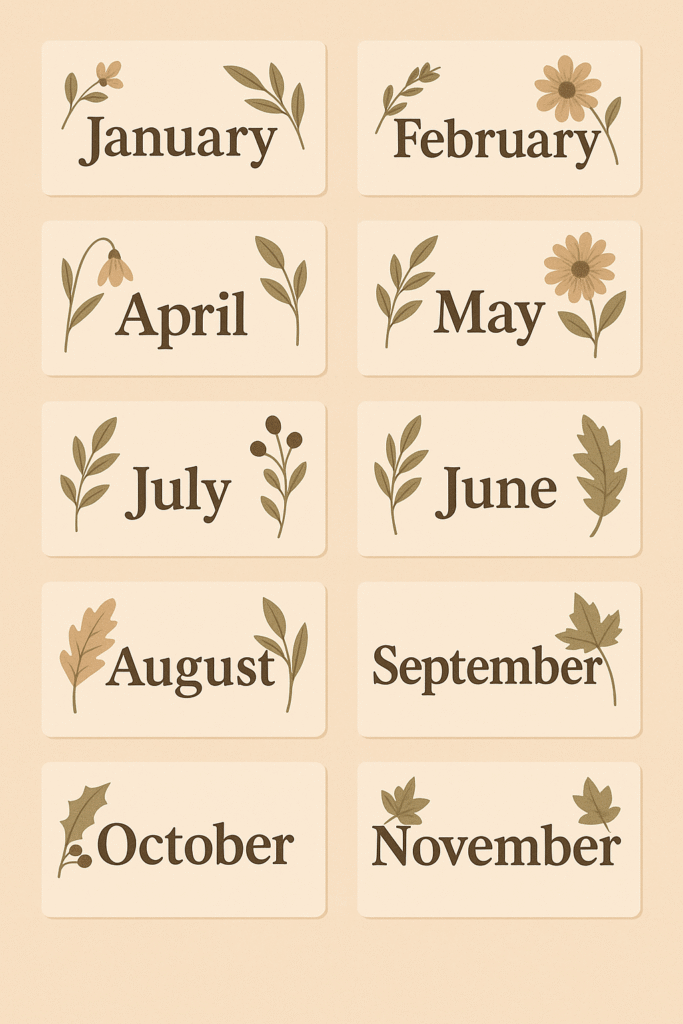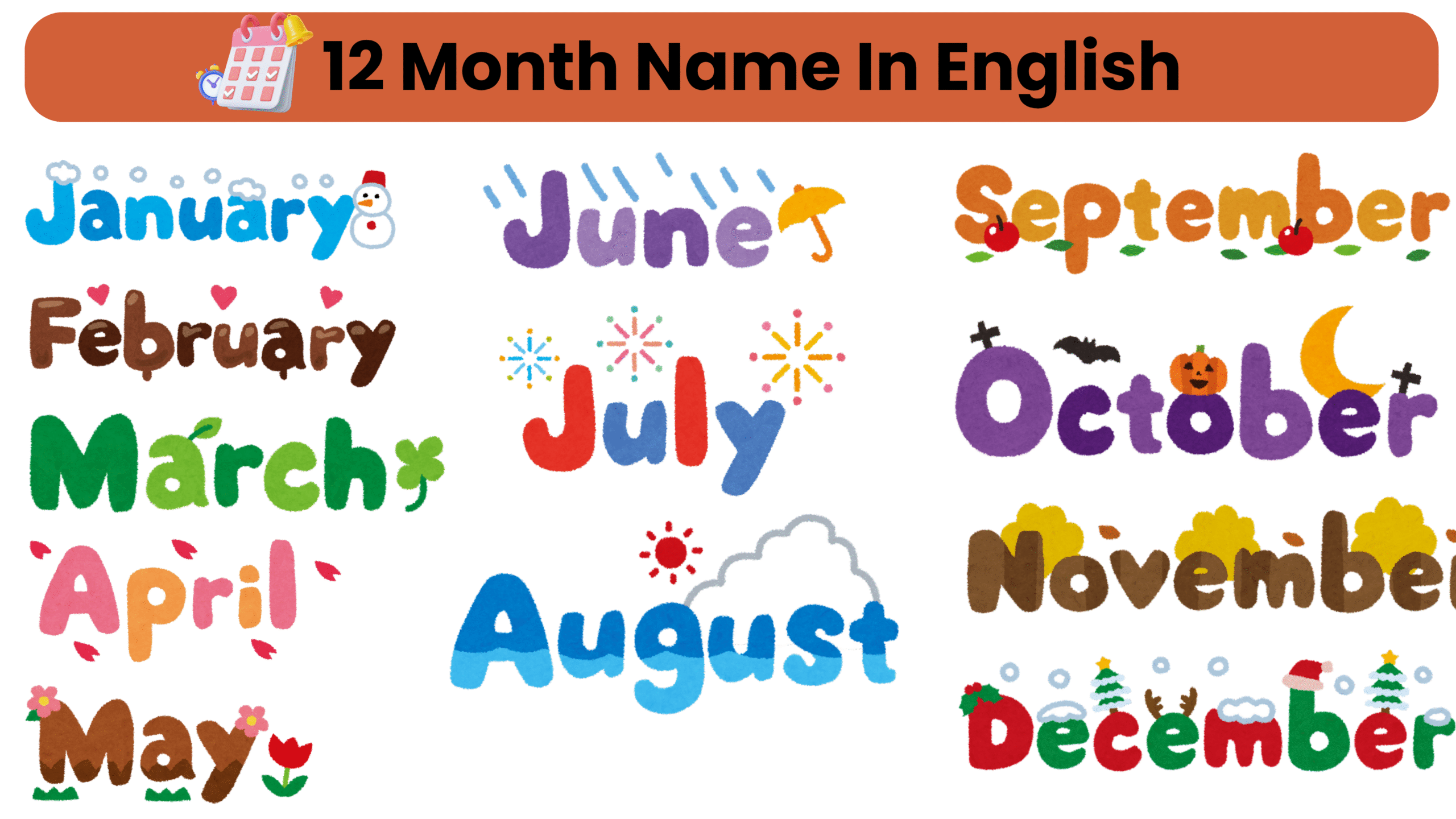Have you ever wondered why each month name is what it is? Why is July named July? Why does February have fewer days? In this comprehensive guide, we’ll explore the 12 months of the year, the origin of month names, their meanings, and interesting trivia.
Whether you’re a student, a parent, or a curious mind, this blog post will give you everything you need to know about the calendar months in a fun and informative way.
📜 What Is a Month?
A month is a unit of time used in Gregorian and Julian calendars, roughly based on the Moon’s orbit around the Earth. There are 12 months in a year, and each month name has a unique story, often rooted in Latin, Roman mythology, and historical events.

📆 List of the 12 Month Names in Order
Here’s a quick glance at the 12 month names and how many days each month has:
| Month | Name Origin | Days |
|---|---|---|
| January | Janus (Roman god) | 31 |
| February | Februa (purification festival) | 28/29 |
| March | Mars (god of war) | 31 |
| April | Latin “Aperire” (to open) | 30 |
| May | Maia (goddess of growth) | 31 |
| June | Juno (goddess of marriage) | 30 |
| July | Julius Caesar | 31 |
| August | Augustus Caesar | 31 |
| September | Latin “septem” (seven) | 30 |
| October | Latin “octo” (eight) | 31 |
| November | Latin “novem” (nine) | 30 |
| December | Latin “decem” (ten) | 31 |
🔍 Month Name Origins and Meanings
Let’s explore the history of each month name and the interesting meanings behind them:
1. January – The Doorway to the Year
- Named after: Janus, the Roman god of beginnings and endings.
- Symbolism: Janus had two faces—one looking forward, one backward—making January the perfect new beginnings month.
- Fun Fact: January was not originally the first month in the Roman calendar.
2. February – The Month of Purification
- Named after: Februa, a Roman purification ritual.
- Leap Year Mystery: February has 28 days (29 every 4 years).
- Related keywords: Shortest month, leap day, winter month.
3. March – The Warrior’s Month
- Named after: Mars, the Roman god of war.
- Fun Fact: March was the first month of the year in the early Roman calendar.
- Spring Begins: In the Northern Hemisphere, spring equinox occurs in March.
4. April – A Time of Blossoming
- Possible origin: Latin aperire, meaning “to open,” reflecting spring blooms.
- Common theme: Rebirth, nature, flowers.
- Related search terms: Easter month, spring month, April showers.
5. May – The Growth Month
- Named after: Maia, the goddess of fertility and growth.
- Cultural significance: Many countries celebrate May Day on May 1st.
- Seasonal marker: Full of greenery and sunshine in many regions.
6. June – The Wedding Month
- Named after: Juno, the Roman goddess of marriage and childbirth.
- Tradition: June is a popular month for weddings worldwide.
- Longest Day: The summer solstice usually falls in June.
7. July – Tribute to Julius Caesar
- Originally called: Quintilis (Latin for “fifth”)
- Renamed: To honor Julius Caesar after his death.
- Fun Fact: Caesar reformed the calendar (Julian Calendar).
8. August – The Emperor’s Month
- Originally called: Sextilis
- Renamed: To honor Augustus Caesar.
- Interesting twist: Both July and August have 31 days—part of Augustus’ demand to be equal to Julius!
9. September – The Seventh Month?
- Meaning: “Septem” means seven in Latin.
- But it’s the 9th month! That’s because the calendar was later restructured.
- Keyword usage: Fall month, back to school, September holidays.
10. October – Month of Eight?
- Name origin: “Octo” means eight.
- Highlight: Halloween is celebrated on October 31st.
- Related keywords: spooky season, autumn month.
11. November – A Month to Be Thankful
- Name origin: “Novem” = nine
- Holidays: Thanksgiving (U.S.), All Saints’ Day.
- Fun Fact: November used to be a sacred month in ancient Rome.
12. December – The Final Month
- Name origin: “Decem” = ten
- Festivities: Christmas, Hanukkah, New Year’s Eve.
- Related terms: holiday season, winter month, year-end.
🧠 Why Are Some Month Names Out of Order?
You may have noticed that September to December are named after numbers 7 to 10, but they’re actually the 9th to 12th months.
That’s because the original Roman calendar only had 10 months. Later, January and February were added by a king named Numa Pompilius, shifting the whole structure.
📚 Educational Uses of Month Names
If you’re a teacher or parent, teaching children the names of the months is a core part of early education. Here are some activities:
- Month name songs
- Flashcards with month illustrations
- Birthday month matching games
- Seasonal craft projects for each month
These activities make learning the calendar months fun and engaging.
🌍 Month Names Around the World
While the English month names are widely used, many languages have their own versions. For example:
- Spanish: Enero (January), Febrero, Marzo…
- Hindi: जनवरी, फ़रवरी, मार्च…
- French: Janvier, Février, Mars…
Learning month names in different languages is a great way to explore cultures.
🗓️ Printable Month Name Chart (Bonus Tip)
Creating a printable month chart for your kids or students helps in:
- Visual recognition
- Understanding seasons
- Learning spelling
You can use cute icons like snowflakes for January, flowers for April, pumpkins for October, etc.
🎉 Fun Facts About Month Names
- February is the only month that can go without a full moon.
- October is when daylight saving time ends in many countries.
- June often sees the most weddings due to the goddess Juno’s connection with love.
- August was added with a day stolen from February to make it as long as July!
✅ Summary: Why Month Names Matter
| Feature | Detail |
|---|---|
| Total Months | 12 |
| Origin | Mostly Roman / Latin |
| Unique Facts | Each month has festivals, seasonal shifts, and cultural relevance |
| SEO Use | Highly effective for blog post timing, marketing, and seasonal content |
Month names are more than just words on a calendar—they’re stories, myths, history, and markers of time. From January to December, these names shape how we plan, celebrate, and remember the year.

2 thoughts on “Month Name Meaning, Origin, and Fun Facts 12 Months of the Year”